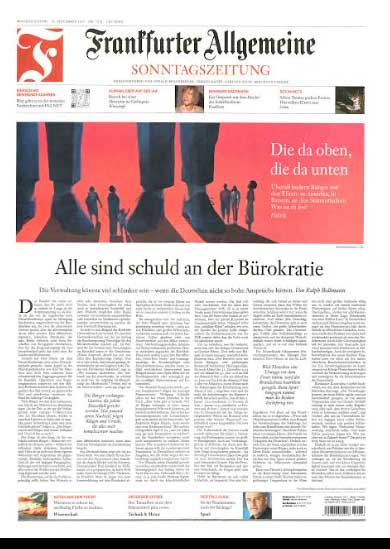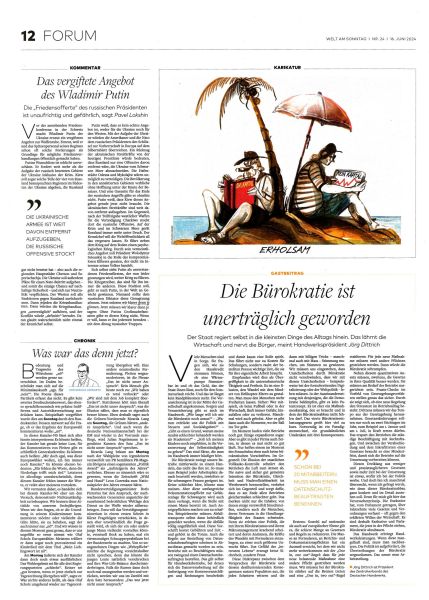Those Damned Pointed-Headed Bureaucrats!
Those Damned Pointy-headed Bureaucrats!
I had a political-science instructor in college with a left-wing orientation to governmental leadership, reflecting his childhood, growing up in a poor, Native-American family in Florida. During class, he expressed his dislike for Dixiecrat politicians and their disapproval of "pointy-headed bureaucrats" messing up the precepts of good government, but maybe he did not realize that both sides deride pointy-headed bureaucrats, from time to time.
I have another memory from college. In advanced French class, our professor made us read a French short-story "Le Passe-Muraille" by Marcel Aymé. It concerns a bureaucrat in France who discovers that he can pass through walls undetected. He could use this unusual gift to his advantage in any number of ways but does not. For one thing, he has "little love for adventure" and is "unreceptive to the lures of the imagination." He only uses it to get revenge on another office-worker.
Anyone who has had to wait in a government office while an unimaginative case-worker wades through stacks of applications and routine circulars knows a thing or two about bureaucracy. Hard to blame the pointy-headed bureaucrat, though. He has to do the same dreary tasks all day long to maintain the flow of "traffic", office-speak for paperwork, while a superior waits behind him, grading his performance.
Here in Germany, I have read two interesting newspaper articles about bureaucracy that present different, complex viewpoints. The first, "Alle sind schuld an der Bürokratie", by Ralph Bollmann, means in English "Everyone owes something to the bureaucracy." It appeared in the Frankfurter Allgemeine newspaper on 10th September of last year. The under-title reads "The bureaucracy could slim down, if the public did not give it so much responsibility for their lives."
The German administration of Chancellor Olaf Scholz would like to pass more legislation in order to create a more efficient, digitalized bureaucracy. Scholz and other politicians never miss a chance to criticize the opposition parties for hindering the bureaucracy's response to the needs of citizens. Politicians describe their opponents' actions as causing a "Stillstand,'' a word that means a lack of progress.
The problem with this is that the politicians also talk about "streamlining" the government, eliminating the expense that results from employing ever more bureaucrats to facilitate better services. The article uses the phrase "der viel beklagte Paragraphen-Dschungel", the oft-criticized jungle of red-tape and regulations. But it says the public demands new legislation to manage "jeden Einzelfall", every little problem, every little risk, and ends up going overboard with bureaucratic red-tape.
Driving the growth of the bureaucracy is "das große Sicherheitsbedürfnis", an obsession with security. The public demonstrates an "Unvermögen, Zufälle oder Schicksalsschläge zu akzeptieren". The public wants nothing left to chance. Newspapers a few years ago used an expression, the Nanny State"; but now the extent of Nannyism reaches a level of "unpraktikabel".
The second article "Die Bürokratie ist unerträglich geworden" appeared in Die Welt on Sunday, 16th June, of this year. In English, it means the reach of the bureaucracy has become unbearable. This article taps into the same angst as the previous article in the Frankfurter Allgemeine. The under-title reads "The government regulates our daily activities to the extent that it handicaps the economy and makes the public shy away from taking risks." One mother complains that her son shies away from the idea of an independent life. For "independent life", the article uses the word "Selbstständigkeit", which can also mean "self-employment".
Not too surprisingly, a disproportionate percentage of new businesses are started by immigrants. Many come to Germany to start a business because they can't in their home countries. They expoect a lower level of social support from their home governments and consequently take more personal risks to get it.
For all the good intentions of a bureaucratized life, our leaders have to ask two questions, whether its intrusiveness decreases our quality of life, and whether it simply costs too much to maintain it. The public will have to decide that. With the likelihood of Germany facing a business slow-down resulting in a need to economize, the push to downsize the bureaucracy may turn into a shove. The government will have to persuade Germans that they can get along without a Nanny, that the risks aren't that great.



